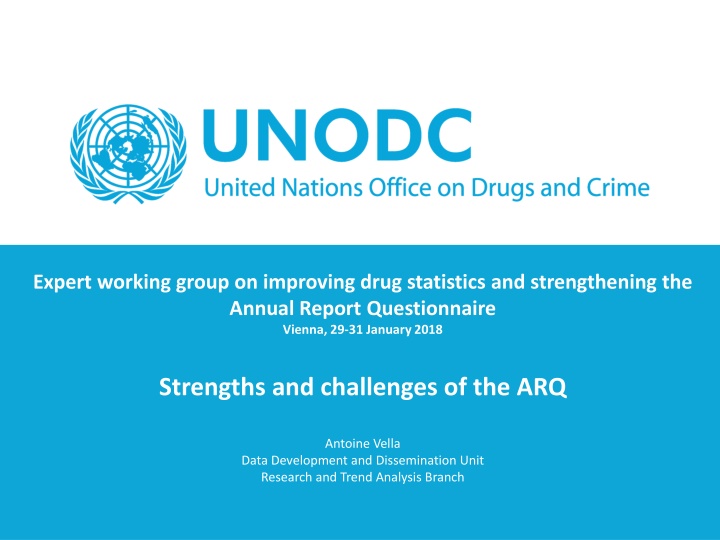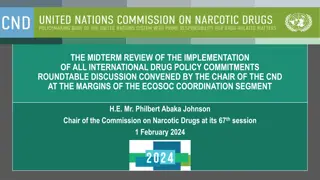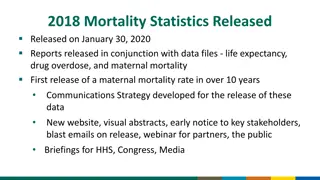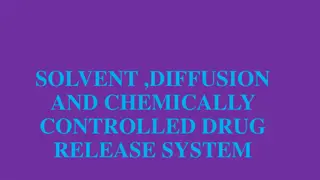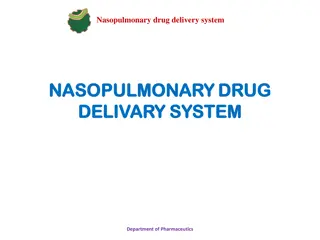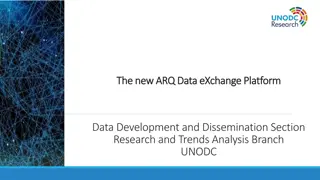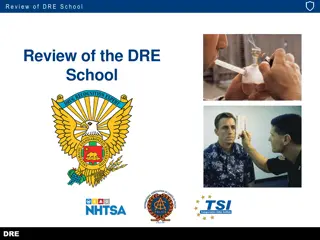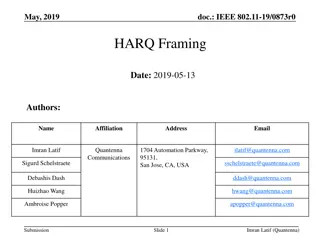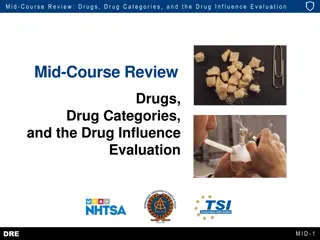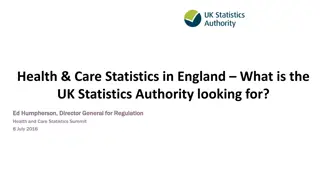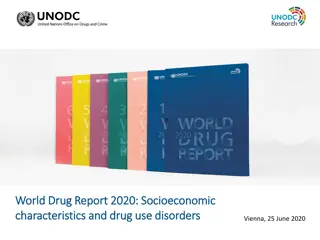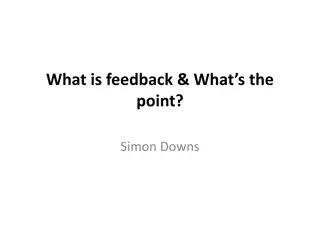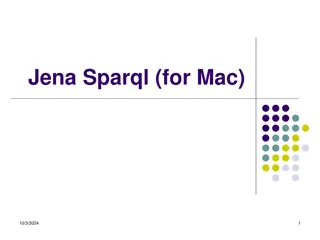Strengthening Drug Statistics: ARQ Review Feedback and Key Areas for Improvement
This report highlights the strengths and challenges of the Annual Report Questionnaire (ARQ) discussed at an expert working group meeting in Vienna. It covers feedback from countries, response rates, challenges, areas for improvement, and emerging data needs, with a focus on enhancing drug data collection and reporting practices.
Download Presentation

Please find below an Image/Link to download the presentation.
The content on the website is provided AS IS for your information and personal use only. It may not be sold, licensed, or shared on other websites without obtaining consent from the author.If you encounter any issues during the download, it is possible that the publisher has removed the file from their server.
You are allowed to download the files provided on this website for personal or commercial use, subject to the condition that they are used lawfully. All files are the property of their respective owners.
The content on the website is provided AS IS for your information and personal use only. It may not be sold, licensed, or shared on other websites without obtaining consent from the author.
E N D
Presentation Transcript
Expert working group on improving drug statistics and strengthening the Annual Report Questionnaire Vienna, 29-31 January 2018 Strengths and challenges of the ARQ Antoine Vella Data Development and Dissemination Unit Research and Trend Analysis Branch
Outline Brief recap of the ARQ Feedback from countries to the ARQ review questionnaire Response rates on current ARQ Challenges and areas of improvement Evolving data needs (NPS, SDG indicator) Synergies and process Conclusions
Feedback to the ARQ review questionnaire Breakdown of MS responses by: Workload (number of working days) to fill in the ARQ Number of institutions contributing to filling in the ARQ Assessment of length
Response rates Availability of drug data reported through the ARQ, 2001-2014, selected indicators Proportion of countries that submitted at least one part of ARQ by region, 2010-2016 Number of countries
Challenges and limitations Length and reporting burden Issues of definition and scope of specific concepts - clarity: need to balance comparability and interpretability against different national data collection practices and capacities - complexity Level of detail of questions Not all questions are equally relevant to all countries Accounting for poly-drug use Classification issues
Areas for improvement Gender-sensitivity Right mix of quantitative, expert perception (categorical) and other qualitative questions Capturing hidden populations, vulnerable groups and other special groups Provision for ad hoc reporting, references to detailed studies, IDS User-friendliness - layout - structure -guidelines Built-in validation, drop-down menus
SDGs, treatment and severe/high-risk drug use Target Indicator 3.5 Strengthen the prevention and treatment of substance abuse, including narcotic drug abuse and harmful use of alcohol 3.5.1 Coverage of treatment intervention (pharmacological, psychosocial and rehabilitation and aftercare services) for substance use disorders ????????? ?.?.? =?????? ????????? ????????? ?????? ?? ???? ?? ???????? ARQ:
Emerging data needs drug-related criminal activities using the Internet socio-economic aspects - drug use - illicit cultivation Money-laundering and illicit financial flows Links with corruption and trafficking in persons, firearms, terrorism
Synergies Several areas of complementarity with data collection conducted by other international organizations Harmonization of concepts with regional data collections Facilitate exchange and cross-checking of data collection and validation Minimize reporting burden, optimize the evidence base for international community
Process Transmission Distribution of ARQ responses received, by month of submission, 2010-2016, selected indicators Online data entry versus submission Variations to be considered from other data collection processes: - Annual (core) versus rotating (non-core) - Updating historical values - Integration with regional collection mechanisms - Follow-up and national focal points
Conclusions ARQ is a crucial reporting channel, currently very demanding Need to streamline and strike a balance between feasibility and desirability improvements (definitions, classifications, re-organisation of questions, etc.) + data/information to add - data/information to drop User friendliness is paramount Core versus non-core: Core: data that are key to understand trends and patterns of the drug problem, they may change at fast pace (on yearly basis) and/or are available for the majority of countries Non-core: data, usually not subject to rapid fluctuations, requiring more in depth/detailed questions and/or are available in a limited number of countries
Thank you antoine.vella@un.org
